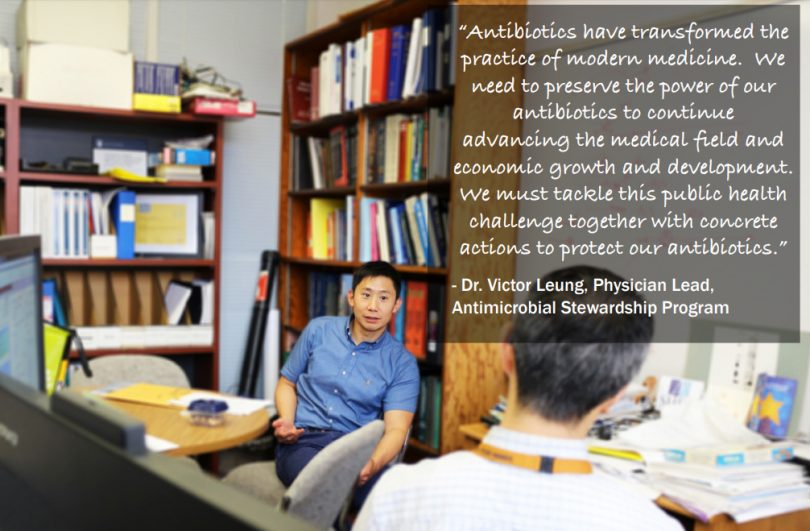
Dr. Leung is medical director for Infection Prevention and Control (IPAC) at Providence Health Care and physician lead of the organization’s Antimicrobial Stewardship Program (ASP). Today he weighs in on the growing threat of drug resistance – what it is, why it matters, and our role in addressing it.
In late April 2019, the UN, international agencies and experts released a ground-breaking report demanding immediate, coordinated and ambitious action to avert a potentially disastrous drug-resistance crisis. The report warned that if no action is taken, drug-resistant infections could cause 10 million deaths each year by 2050 and damage the economy as catastrophically as the 2008-2009 global financial crisis. Recently, the New York Times covered this very matter and the impact antimicrobial resistance is having on one of the world’s most common ailments, urinary tract infections.
Antibiotics have transformed the practice of modern medicine; they have been successful in the treatment of many infectious diseases over the last 70 years. We need to preserve the power of our antibiotics to continue advancing the medical field, and economic growth and development.
In response to the growing threats of antimicrobial resistance and antimicrobial overuse, we established an Antimicrobial Stewardship Program (ASP) at Providence on April 1, 2013. Our approach has focused on encouraging dialogue, targeting education, improving accessibility to expert guidance, improving timely diagnostics and collaborating with physicians and surgeons to develop context-specific measures.
Implementing measures to improve responsible prescribing is paramount. Antimicrobial prescribers must practice responsible antimicrobial use to ensure antimicrobials are available in the future.
We know that in many Canadian hospitals, a significant proportion of antibiotics are misused in the following ways:
- Prescribing antibiotics when they’re not needed.
- Prescribing for prolonged duration.
- Choosing the sub-optimal antibiotic (e.g., type, dose, route of administration) for the infection.
The numbers vary in Canadian hospitals, and some reports some have found up to 40% of antibiotics are misused. We are increasingly seeing infections that have very limited treatment options because of drug resistance. In some cases, we have infections that cannot be treated with antibiotics at all.
Penicillin allergies are a big problem for prescribing practice because many people have this label on their health care record or they think they have an allergy. At Providence, 15-20% of patients report penicillin allergy.
We know from multiple studies that the penicillin allergy label is associated with harm:
- Patients have worse treatment outcomes because of alternate antibiotics being used
- Longer hospital stays, increased chance of infection with drug-resistant bacteria
- In some cases, double the risk for surgical site infections
- Increasing side effects
If you are a patient who currently has a penicillin allergy flag on your record, here are some steps you can take to see if your penicillin allergy label should be removed:
- Ask your care team to take a proper allergy history and determine the next steps based on the answers provided.
- More toolkits are now available for your health care provider to use for clarifying allergies (e.g., Spectrum MD App – the app is available for free download on both the Apple and Google Play)
We must tackle this public health challenge together with concrete actions to protect our antibiotics. The biggest challenge in addressing antimicrobial resistance is to first make sure everyone understands the importance of antibiotic use and understands what the long-term implications will be if appropriate microbial use isn’t seen as everyone’s responsibility.
If you are a patient being prescribed an antibiotic, here are some steps you can take to prevent misuse:
- Discuss with your care team what the antibiotic is being used for and the duration it’s being prescribed for
- Learn more about the antibiotic you are taking and its potential side effects
- Antibiotics are not useful for treating common viral infections (e.g. colds, acute sinusitis). Ask your care providers if the infection you may have is most likely a viral infection that can be managed without antibiotics.
We need to continue our commitment to antimicrobial stewardship so that we can thoughtfully address the increasing rates of antimicrobial resistant infections, and maximize the use of the limited antibiotics in our current toolkit.
Learn more about the leading antimicrobial stewardship work being done at Providence in this year’s ASP annual report.

Some members of Providence’s Antimicrobial Stewardship Program’s Clinical Team and Subcommittee, (l to r) Dr. Sylvia Champagne, Dr. Sylvain Lother, Dr. Tien Nguyen, Dr. Marc Romney, Dr. Michelle Hinch, Dr. Eric Eckbo, Dr. Victor Leung, Dr. Glen Brown, Dr. Peter Phillips





